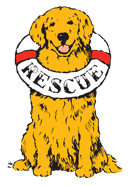There are many risk factors that can increase a dog’s susceptibility; however, the main cause for spreading this virus is either through direct contact with an infected dog or exposure by sniffing an infected dog’s stool or anus. The virus can even be transmitted from place to place by shoes that have come in contact with infected fecal matter. Additionally, this nasty virus can live in ground soil for many months and is resistant to weather changes and most cleaning products. If there was ever an argument for an ounce of prevention being worth a pound of cure, preventing parvo is certainly it.
Following the correct vaccination protocol is the best defense for your dog. All dogs are at risk, but puppies are most susceptible. Puppies should be vaccinated at seven weeks with two additional vaccinations three to four weeks apart and should not socialize with unknown dogs until at least two weeks after their third shot. Additionally, immediate clean up of feces is a good habit to start and maintain to avoid the spread of this virus and other intestinal parasites. Be sure to ask your vet about the parvo vaccination protocol for adult dogs and always keep it up-to-date.
There are two forms of parvo: intestinal and cardiac. The former is the more common, and its symptoms include vomiting, severe bloody diarrhea, fever, weight loss and lack of appetite, weakness, and/or dehydration. Intestinal parvo affects the dog’s ability to absorb nutrients, and dehydration quickly develops. Left untreated, death can occur two to three days after the onset of symptoms. The cardiac form is rarer and attacks the heart muscles of fetuses and young puppies and is often fatal.
Vets diagnose parvo with a physical exam, blood tests, and fecal testing. Since it is a virus, there is no specific cure. Treatment includes focusing on the symptoms and preventing secondary infection, most preferably in a sterile, hospital environment, with intravenous fluids and nutrition therapy administered to the dog with continual monitoring. When treated in a hospital, the prognosis for survival is 70 to possibly 90 percent; however, the survival rate for puppies is much lower.
Because of the highly contagious nature of parvo, at Golden Gateway, we take many steps to avoid its spread by washing and sterilizing bowls, blankets, toys, and yes, tennis balls, too. Plus, pooper scoopers are in every play yard and staff cleans up quickly. Additionally, we require proof of parvo vaccination (DHLPP or DA2PPL) as well as other diseases for any dogs that board at Golden Gateway at least one week prior to the boarding date with the vaccine administered at least two weeks prior to the dog’s stay with us.
We take avoiding the spread of parvo very, very seriously… and so should you!
(Reprinted from Golden Opportunities, V-26, Issue 3, 2019)






